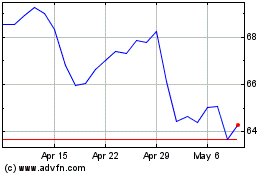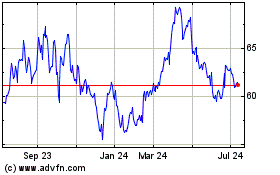By Caitlin McCabe, Will Horner and Xie Yu
Investors around the world retreated from stocks Tuesday, with a
selloff in technology companies spreading to other sectors as
concerns about inflation dragged U.S. indexes down for a second
consecutive day.
The Dow Jones Industrial Average tumbled nearly 475 points as
investors pulled back bets on many of the financials, industrials
and energy stocks that have outpaced the broader market this year.
The fall marked the blue-chip index's steepest one-day decline
since late February when worries about a sharp rise in bond yields
blunted momentum in the stock market.
Concerns about rising inflation have loomed over markets for
much of this year as the U.S. economy has heated up, boosted, in
part, by pent-up demand and government stimulus. Fears about a
sustained jump in inflation have weighed on growth stocks,
including those in the tech sector, while cyclical shares have
climbed on expectations of a full economic reopening.
On Tuesday, however, that trade reversed, as stocks ranging from
Home Depot to Chevron to American Express pulled back 2.6% or more,
dragging the Dow down. Only two companies in the index of blue-chip
stocks finished higher. The index closed at 34269.16, falling
473.66 points, or 1.4%.
Many technology stocks, in contrast, finished higher after
falling sharply earlier in the session. The Nasdaq Composite edged
down 12.43 points, or 0.1%, to 13389.43, cutting its losses after
falling as much as 2.2% earlier in the day.
The S&P 500 dropped 36.33 points, or 0.9%, to 4152.10, also
paring earlier losses.
In bond markets, the yield on the 10-year U.S. Treasury note
edged up to 1.623%, from 1.601% Monday, marking its third
consecutive session of gains. Yields rise as prices fall.
"It's a bit of a topsy-turvy market," said Chris Zaccarelli,
chief investment officer of Independent Advisor Alliance. "We have
a lot of news flow as far as gasoline shortages, the hack of the
[Colonial Pipeline] and clearly everyone has been talking about the
jobs report [and whether that means] anything or is it reflective
of weakness in the economy."
"It's hard to tell with these crosscurrents moving as violently
as they are," he added.
Tuesday's wild swings in the stock market sent the Cboe
Volatility Index, or VIX, known as Wall Street's fear gauge,
climbing. It traded as high as 23.73 intraday, its highest intraday
level since March 10. The VIX has largely hovered below 20 for the
past several weeks as the U.S. stock market has climbed to repeated
records.
The S&P 500 and Dow industrials set records as recently as
Friday after a lackluster jobs report for April sent stocks
climbing on hopes that it would prompt the Federal Reserve to
further delay a tightening of monetary policy.
Federal Reserve Gov. Lael Brainard said Tuesday that the central
bank remains far from achieving its inflation and employment goals,
noting that risks remain even while the U.S. outlook is bright.
Other Fed officials have said in recent days that the economy still
needs the support of the central bank's near-zero interest-rate
stance and its $120 billion in monthly bond purchases.
Still, those comments haven't been enough to assuage investors'
fear of inflation and eventual tightening of monetary policy. Many
are betting that inflation is likely to climb steeply in coming
months, driven by pent-up spending as well as supply bottlenecks
and a leap in commodity prices.
"Inflation is an issue that is on everyone's minds right now,
and it is injecting a lot of uncertainty," said Peter Langas, chief
portfolio strategist at Bessemer Trust.
Investors are keeping a close eye on the sharp rise in the
prices of commodities such as corn and lumber, and many remain
concerned about supply-chain issues and disruption of
manufacturing. Companies ranging from auto makers to semiconductor
giants have warned about supply chain setbacks in recent
months.
"Issues with the supply chain have been underappreciated," said
Christopher Harvey, head of equity strategy at Wells Fargo
Securities. "It looks like your economically sensitive names are
getting hit related to these issues."
Among the S&P 500's 11 sectors, energy stocks suffered the
steepest fall Tuesday. Occidental Petroleum dropped $2.10, or 7.9%,
to $24.53, while Exxon Mobil lost $1.99, or 3.2%, to $60.59.
Other cyclical companies that posted big losses included home
builder PulteGroup, which fell $2.81, or 4.5%, to $59.54. Royal
Caribbean declined $2.65, or 3.2%, to $81.28.
Megacap tech companies Google parent Alphabet, Apple and
Microsoft also retreated, while Tesla lost $11.84, or 1.9%, to
$617.20. Semiconductor giant Intel fell 93 cents, or 1.7%, to
$55.04.
Palantir Technologies, in contrast, jumped $1.74, or 9.4%, to
$20.21 after the data-mining-software specialist reported
better-than-expected revenue and gave a strong forecast. Technology
stocks including Twitter and Snap finished higher after trading
lower earlier in the session.
In corporate news, Novavax shares plummeted $22.32, or 14%, to
$138.18 after the company said it delayed plans to seek regulatory
clearance for its Covid-19 vaccine.
Overseas, the pan-continental Stoxx Europe 600 dropped 2%. In
Hong Kong, the Hang Seng Index fell 2%. Japan's Nikkei 225 slumped
3.1%, while South Korea's Kospi index retreated 1.2%.
Fresh data showed that factory-gate prices in China jumped last
month by the most in 3 1/2 years, adding to concerns about
inflationary pressures spreading globally.
Write to Caitlin McCabe at caitlin.mccabe@wsj.com, Will Horner
at William.Horner@wsj.com and Xie Yu at Yu.Xie@wsj.com
(END) Dow Jones Newswires
May 11, 2021 17:16 ET (21:16 GMT)
Copyright (c) 2021 Dow Jones & Company, Inc.
Occidental Petroleum (NYSE:OXY)
Historical Stock Chart
From Mar 2024 to Apr 2024

Occidental Petroleum (NYSE:OXY)
Historical Stock Chart
From Apr 2023 to Apr 2024
